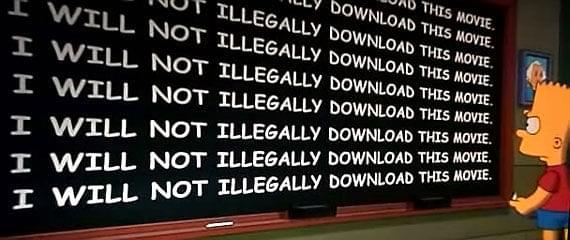
The greatest crisis facing Hollywood today is piracy. Well, that’s not strictly true. Hollywood’s greatest crisis is that Hollywood’s profits are not as high as Hollywood would like them to be, and piracy is an easy thing to blame it on. If people are buying fewer movie tickets than they used to, it must be because they’re illegally downloading the movies at home! It’s certainly not because ticket prices are too high and movies aren’t that good anyway and people have high-quality sound systems and big-screen TVs at home and theaters are hellish dens of rude jackasses and you have to sit through 20 minutes of commercials and previews before the film starts and concessions are so absurdly overpriced that even people who work in the banking industry think, “Wow, they are really ripping us off here.” No, it can’t be that. It must be piracy.
They sound like hysterical Victorian women, these studio executives. “Why are we losing money? Because of pirates! PIRATES, I say! Great flotillas of them! Oh, do hide our ladies and children from the fearsome pirates! Where is my fainting couch??”
I don’t mean to suggest that the illegal copying and distribution of movies isn’t a legitimate concern. Of course it is. But the profit losses that studios attribute to piracy are comically exaggerated, and their anti-piracy efforts are ineffective, driven by pants-befouling panic rather than logic. Hollywood’s response to piracy has been like a meth addict’s response to being set on fire, with a lot of counterproductive screaming and running around in circles and paranoid accusations about who lit the match.
The reason for this is that while movie studios produce a lot of cool, hip things, the studios themselves are run by elderly white men. And if there’s one thing elderly white men are afraid of, it’s everything. That especially includes new things like smartphones, and even no-longer-new things like the Internet. The elderly white men who run Hollywood have only recently gotten over their fear of television and Hispanics. Now they’ve heard young people talk about filming something with their iPhones and posting it online, so they conclude that iPhones are a piracy tool and ban them from preview screenings, even screenings of 3D movies, which you couldn’t film with an iPhone anyway. All of this is because the people who make the rules fear and misunderstand technology.
Think of your uncle. The one who believes he’s emailing you when he’s actually posting on your Facebook wall, and who’s afraid to leave his computer on overnight lest identity thieves creep in through the ethernet cable and steal his passwords. That’s who runs Hollywood.
What unnecessary and useless steps are the studios taking to reduce piracy? I’m glad you asked, hypothetical person who asks me things while I’m writing!
One new tactic, announced last month, has to do with the FBI warning that appears at the beginning of DVDs and Blu-rays. Common sense tells us that this warning has almost certainly never prevented a single act of piracy. Nobody who intends to make copies of a DVD is going to be dissuaded by the FBI warning, any more than a sign reading “It is against the law to rob banks,” posted at banks, would stop someone from robbing banks.
Anyway, since these warnings are ineffective, the obvious solution is to have more of them. With the endorsement of the Motion Picture Association of America’s member studios, the U.S. government has revealed new anti-piracy warnings that will appear on all new DVDs and Blu-rays starting this year. There will be two of them, back-to-back, each 10 seconds long and unskippable. They want you to sit there for 20 seconds and reflect on the horrors of piracy – which, having lawfully rented or purchased the DVD you’re watching, you have not engaged in. (You know who won’t have to sit through those warnings? People who download the movies illegally. I’m just sayin’.)
Something else that the studios have been doing for several years that is a complete waste of time and money is hiring security guards to monitor preview screenings for piracy in action. These poor saps have to stand at the door as the audience members file in, checking their bags for cameras and running metal-detector wands over their bodies like visitors at a prison. You thought you were going to a fun promotional screening of “What to Expect When You’re Expecting” – but nope! It turns out you’re meeting with a mobster who suspects you’re wearing a wire!
If you have a phone that can take pictures, sometimes you’re merely admonished not to use it. (If you have a phone that doesn’t take pictures, you are laughed at.) But sometimes, depending on which movie studio is involved, you are told you cannot bring the phone into the theater, period. You can take it back to your car – or you can hand it over to the security goons, who will put it in a brown lunch bag and give you half of a raffle ticket as a claim check. That phone of yours? The one that cost a few hundred dollars? Just give it to some guy! You can trust him. I mean, if you can’t trust a stranger who’s making ten dollars an hour to protect Adam Sandler’s intellectual property, whom can you trust? I ask you? WHOM??
This whole process is pointless for several reasons. One, bootlegging a movie by sneaking a camcorder into the theater is very 1990s. People don’t really do that anymore. In the 21st century, most illegal versions of movies are digital copies that were leaked online by someone at the studio who had access to them. The studios haven’t figured out how to stop that, though, so they make a big show out of stopping this other thing that nobody’s doing anyway.
Another reason the heightened security is silly is that they only do it at preview screenings. Once the movie opens, it’s up to the individual theaters to prevent people from bringing video cameras in. And if you’ve been to a theater recently, you know how many craps their employees give about piracy (or anything, really), i.e., no craps.
Now wait a minute. I’m a movie critic, a member of an elite professional group that includes just four hundred thousand Internet writers, plus eleven newspaper writers. Surely my colleagues and I aren’t subject to these heavy-handed anti-piracy tactics. The riff-raff that shows up at preview screenings, fine. You don’t know who those people are. But the critics were invited to the screening. We’re there because the studio’s publicist sent an email saying, “You – you, specifically, a person on our press list – are invited to come watch this movie!” They know who we are, who we work for, and where we live. Surely there is no reason to confiscate our phones! Surely we would not be on your press list if you thought there was a chance we’d steal your movie!
Surely there’s especially no reason to go through all that nonsense at a press-only screening, with everyone in attendance having been personally invited by the studio to be there. Why, it would be ludicrous to set up a screening just for critics, then act like the people who show up are random, shifty-eyed drifters that you don’t trust.
Ah, but there’s your mistake. You’re thinking like a rational person. Remember, when it comes to preventing piracy, Hollywood’s attitude is exactly the same as the TSA’s attitude toward preventing terrorism: WE DON’T KNOW WHAT TO DO HERE ARE SOME RANDOM RULES THEY ARE DUMB DO NOT BREAK THEM WE ARE IN CHARGE WE ARE THE BOSS!!! And the only thing more pointless than the rules is pointing out how pointless the rules are. The security guards are just following instructions. The people who make the rules are back in Hollywood, on the phone with tech support because they can’t get Internet Explorer 7.0 to quit freezing up.
Is it insulting to be invited to a screening and then treated like a criminal? Sure. But it’s also insulting to be invited to a screening and then shown a Nicolas Cage movie. What’s really irksome is hearing movie studios sob about diminishing profits due to piracy, even as they’re wasting millions of dollars on impotent anti-piracy efforts. You want to make more money? Quit paying four security guards to attend every advance screening of every film in every market in the country. Come on, it’s hard enough work telling you what’s wrong with your movies. Do I have to tell you how to run your business too?




